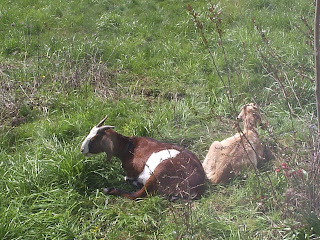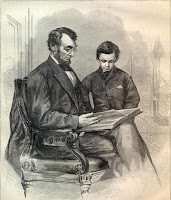
Honestly, truly, I think clowns are very creepy. I don't like anything with a mask on - it's lying. Treacherous. Deceitful. Masks hide people. I do not like masks, and I never have.
But even I was once a clown.
It's true. I spent the two-week Vacation Bible School days of one summer's June changing in and out of my costume, to become Mr. Happy. Why does a Vacation Bible School need a clown? It's supposed to be because the children love clowns. I don't really know any children who love anything with a mask on its face, but that was the working theory.
So, that year's curriculum included a clown called Mr. Happy. Who would do it? Who'd be brazen enough and fearless enough and careless enough about any lasting reputation to dress up in a clown's costume every day for Vacation Bible School? Did anyone have a costume already?
No. Nobody had a costume. But one family had a teenage daughter. And it was pretty obvious that this family would do anything, and they always worked the VBS ... well, it's a natural fit.

The dad of the family was in charge of transportation (a job he absolutely loved because he could map the city, plot the routes for picking up the kids, send out the buses, and drive one of them himself), and recreation (which was playing games in the enormous parking lot). That was a man who never ran out of ideas. It rained during the recreation times one day - but that didn't stop him. He loaded the kids onto one of the buses, and took them on a parking lot tour - fully narrated and thoroughly enjoyed by everyone on the tour.
And the mom in that family had been doing VBS for so long that she was always in charge of one of the departments. It was going to be the 4th - 6th graders that year, if I remember rightly. Organizing the teachers, cutting out the endless pages of Bible characters and visual aids (and enlisting family members to help out) ... telling the stories up at the flannelgraph board to the whole department before everyone split up into smaller classes to work on their crafts for the day and their memory work Bible verses ... she was a whirlwind of organization and energy.

Ask their daughter to be the clown. She'll do it. Do you think she'd really do it?
I'm not sure about this part, but I think my mother approached me in private, at home, and very quietly. (Why was she so careful about it?) Would I like to do it? I believe my first answer was no. But then I realized that the senior members of the team have their responsibilities. So I said yes. And I put together a clown costume. And it was such a thoroughly good costume that nobody recognized me. I found all the pieces, including a really silly hat. And then I found a "voice" - a distinct voice, a never before heard by human ear, Mr. Happy voice.
Et voila! Mr. Happy, the VBS clown.
That was the summer I suddenly understood why people become professional actors. If you have a whole other person to inhabit, you are magically and completely freed from yourself! All learned inhibitions vanish in a puff of smoke - as instantly as the air exits a popped balloon.
When a lanky teenage girl, generally known for her somewhat serious view of the world, her embarrassingly large vocabulary, and her relentlessly earnest intensity puts on a silly hat and huge shoes, and then uses a different voice, she becomes unrecognizable to the people who have seen her grow up. These people who saw me every week, on Wednesday nights for Pioneer Girls, and twice on Sundays, really did not know who had showed up as Mr. Happy the VBS clown.
For the one behind the camera - or the mask - or the odd voice and mannerisms (where did those
come from anyway?) -

not only is there the freedom of utter anonymity, there is also a strange disconnection. It's a wall of glass - a one-way mirror like the one at that church's nursery, put into the wall so that the parents could see in without the children seeing the parents. (I've never thought before just this moment about how creeped out that makes me - on behalf of the children, I mean. I felt the creepiness of being watched without being able to see the watchers every time I worked in that nursery.) If you're inside a costume, you see what you otherwise would not see. Like Scrooge visiting his past, present, and future with the visiting spirits, I could see and hear the people I knew, but they did not know I was there. I wasn't there. Mr. Happy was there.
I wonder why I've suddenly recalled Mr. Happy. It's probably the chilly wet spring. There must be something about the weather that reminds me of those years. This would be the time when all the planning meetings were happening. I spent a lot of hours sitting at the dining room table or out in the middle of the living room floor, cutting things out during those teenage spring seasons. I helped host the meetings of the teachers who gathered at our house to talk about the lessons, bringing to the table the things from the kitchen that I'd helped prepare before they got there. And that one year, I also found and tried on various items for a clown costume. It must be the season, somehow, that reminded me about all of this.

And ... there seems to be something about that whole experience nagging at the back of my brain. I want to try to put it into words.
I think it's something about the mask. It's something about the modern ease of resort to "trickery or deceit" (St. John Chrysotom warned against this method of "evangelism" in the Christian church - so it must've always seemed like a good idea.)
Such methods hold a danger for the tricked, of course. There are many instances of the bait-and-switch method of getting members in modern American evangelicalism. There are Easter Extravaganzas, with door-knobs in the neighborhood getting ads hung on them during the weeks preceding the Big Event. The family and friends of the enthusiastic endure all the enticements during these campaigns. The idea is to bring the people in, then sneak up with the conversion message. In the parlance of the early 80's, it was, "find the point of convergence," so that you and your neighbor have feelings of camaraderie - then witness and win him to your side. The mentality makes me feel ill - I wish I could apologize to everyone who ever saw me get anywhere near it.
But there's another danger. It's dangerous for the clown. You gotta ask some questions of yourself if you're looking into a mirror in that outfit.
If I'm a clown, and the message is in my hands, spoken in my funny voice, what, exactly is this message? Is it real? Does it mean anything? Anything real? Anything necessary? Or ... is this message I'm bringing something I don't have to touch for myself - that nobody has to touch for real? Is it a mental trick - or a physical, spiritual, actual reality? Why didn't the presence of Mr. Happy, the VBS clown seem to trivialize things? Spending a couple of weeks as a Vacation Bible School mascot can make a girl wonder a few things.
But kids know the difference, I think. They seem to know what parts matter and what parts don't. They're willing to play their bit parts so that the adults will be placated, of course. So they laugh at the clown and learn the lessons that the clown brings with his daily appearance in their departments. (Of course they learned the lessons during the Mr. Happy summer - there was an instinctively excellent teacher behind that funny hat and bizarre voice!)
But those kids also knew what was important.

One of the projects we did that year was to raise money to buy, and also to bring food, to fill a huge cooler to send to the missionaries. The missionary coolers were a smashing success that year. Of course, the idea was to bring foods that could be packed into the cooler and travel from America to places like the Philippines Argentina. Non-perishable food. That was the idea. That was specified on the first day's Take-home Sheet - with the permission slips and the memory verses. Across the days, the kids brought in their money offerings (their own, and whatever they could extort from their family and friends), and they brought food from their own cupboards, and they filled that cooler.
One little boy in particular, a kid in my mother's 4th-6th department, deeply understood and personally adopted the concept ... but he came every day on the VBS bus because his folks didn't have the money or leisure time to bring him somewhere during the weekdays.
And one day he brought his offering for the cooler. It was a partially-eaten half-gallon container of ice cream - apparently purloined from his family's freezer.
He stood there, trying not to cry, holding out the dripping cardboard, and wailed (quietly), "I didn't know it would turn into milk!"
When I first heard that story - at the dinner table that night, when the department head and the bus driver/recreation captain were comparing notes for the day - I heard the embarrassment they felt for the boy. And the sympathy. They could relate to him, I think. But what I did not hear was admiration.
Thinking back on it now, as I find myself looking around my house for things to cut out with the scissors and pile into nice neat piles of ready-to-assemble, I have a different understanding than I did then. Now, I think, perhaps, the kid whose ice cream turned to milk had a better grasp on his faith than Mr. Happy the VBS Clown ever thought of having - even if the child's grasp was a bit sticky and even though it dismayed him. At least he wasn't hiding behind a hat and a funny voice.
 God's people are repeatedly admonished to "fear not" and to "lay aside all malice and anger." And generally, these commands aren't handed down in times of peace and prosperity, if you know what I mean. Social justice isn't the occasion here. Great victories aren't the setting.
God's people are repeatedly admonished to "fear not" and to "lay aside all malice and anger." And generally, these commands aren't handed down in times of peace and prosperity, if you know what I mean. Social justice isn't the occasion here. Great victories aren't the setting.
 "Yes, you do feel fear, you do feel scared but you have no idea the blessings that you have coming to you if you just take a chance on faith."
"Yes, you do feel fear, you do feel scared but you have no idea the blessings that you have coming to you if you just take a chance on faith."














































